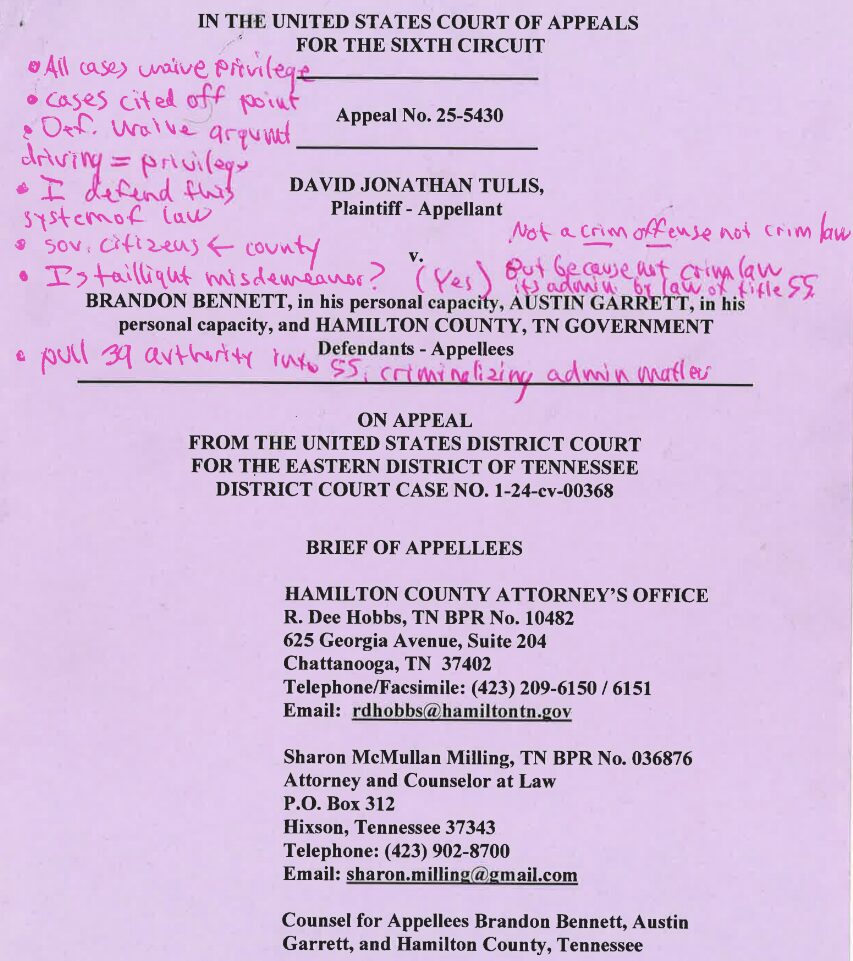
I an suing sheriff Austin Garrett, second from right, and demanding an end to general warrants and criminal traffic stops in a cause being heard in the 6th federal circuit court of appeals. Sheriff Garrett’s lawless protocols generate crime, defendants and needful warm bodies for the Silverdale jail he oversees. All media outlets in Tennessee, even the hometown Chattanooga Times Free Press, have refused to cover this case, desiring to maintain “the way we do things here” and public confidence in the system,(Photo HCSO)
CHATTANOOGA, Tenn., Friday, Aug. 8, 2025 — Hamilton County Sheriff Austin Garrett answers my attack on criminal traffic stops with an 18pp brief containing 11 pages of argument that perfectly ignore the central issue of my lawsuit, waiving any defense against my killer issue: My right to have the state exhaust its administrative remedies under the driver license law, with the criminal case against me premature and unripe, pending outcome of damaged taillight proceedings under UAPA for alleged license agreement breach.
The sheriff, the county and deputy Brandon Bennett whom I sue in personal capacity are counting on the 6th circuit appeal panel to deny my petition under the prejudice and presumption that it is a “‘sovereign citizen’ style” argument “that driving without a license is lawful if not done for profit.”
The county realizes, I surmise, that if its defense even touches the issue of privilege law and the duty of the state to give me a hearing under license procedure, that its cause is lost. So it has to entirely ignore it as a “sov cit” frivolity, hoping that its scoffing ignoring of my powerful appeal brief will secure the court’s favor and approval of dismissal of U.S. district court judge Travis McDonough.
Well, I would never argue such nonsense that “driving without a license is lawful if not done for profit.” Mr. Bennett’s argument is cut, chopped and dried. Deputy Bennett had probable cause to arrest me for a damaged taillight, and to charge me criminally for the taillight and for refusing to show a driver license.
The vehicle stop due to a visibly damaged taillight was supported by probable cause. Indeed, the Appellant does not contest whether probable cause existed. Thereafter, the Appellant’s failure to produce a driver’s license at the request of the arresting officer provided additional probable cause for an arrest. The damaged taillight and failure to produce a driver’s license upon request are clear violations of Tenn. Code Ann. § 55-9-402 and 55-50-351.
Longstanding precedent permits warrantless arrests for even minor misdemeanors when such are committed in an officer’s presence. The Appellant’s theories regarding “traveling in commerce” and the inapplicability of traffic laws have been soundly and repeatedly rejected by state and federal courts. Finally, the Appellant’s Monell claim against the County fails due to the failure of the Appellant to allege any underlying constitutional violation or policy-based conduct attributable to the County.
County reply Bennett case 6th circuit

Screen grab from my marked-up working copy of Sherif Austin Garrett’s defense of unconstitutional general warrants and criminal traffic administration.
None of the 18 cases Sheriff Garrett cites are of petitioners who bring up the rights under UAPA and exhaustion of remedies. Every other case, every lawyer in appeals, every court has ignored the issue because it has not been properly raised. Courts will not rule theoretically or abstractly, but only on justiciable questions brought before them. (1)
Read county’s defense of crime-generating protocol called ‘traffic stop’

I am reporter with Eagle Radio Network — marvelously playing rock hits in Chattanooga, and online at https://www.eagleradionetwork.com/
My lawsuit says Bennett did not have probable cause to criminally arrest and charge me because he admitted in the video that I was not moving in commerce, thereby destroying his casus belli (his probable cause), and because he and the county were under my magnificent Tennessee transportation administrative notice since March 2018 as regards traffic law, and since April 2020 as regards warrantless arrest authority.
“If they admit it as an argument, they’re done, I think,” I tell, Arthur Jay Hirsch in Lawrenceburg, Tennessee gnome emeritus.

Jay Hirsch, Gnome emeritus, left, and Christopher Sapp, Eagle Radio Network midstate bureau chief, talk about law after filing documents with the state supreme court and the attorney general’s office. (Photo David Tulis)
“That’s why it’s never brought up, and if you bring it up, they ignore it, get around it or just overrule it. The thing is, the reason they keep using ‘sov cit’ is because, any time you raise anything that helps the people get out from under the heavy hand of tyranny, whether in the order or good arguments or using the constitution or privilege, these are means by which the people can start relieving themselves from the oppression. And so they just sweep everything into that category of ‘sov cit’ — and that’s a presumption. It needs to be addressed. The courts are the ones that have conspired, like the Sanhedran, some kind of a technique or method by which they can address these challenges because over the decades, more and more people are becoming informed and challenging them, and they don’t know what to do.”
“Then they take one incident, where I guess there was a shootout somewhere [Gordon Kahl slain June 3, 1983], then they take that incident and apply it to everyone. That’s absurd. Comes right back to presumption.”
-
We agree with the Circuit Court of Appeals that the question to be determined is limited to the validity of the contract of January 4, 1934. The pronouncements, policies and program of the Tennessee Valley Authority and its directors, their motives and desires, did not give rise to a justiciable controversy save as they had fruition in action of a definite and concrete character constituting an actual or threatened interference with the rights of the persons complaining. *** There is a further limitation upon our inquiry. As it appears that the transmission lines in question run from the Wilson Dam, and that the electric energy generated at that dam is more than sufficient to supply all the requirements of the contract, the questions that are properly before us relate to the constitutional authority for the construction of the Wilson Dam and for the disposition, as provided in the contract, of the electric energy there generated.” Ashwander v. Tennessee Valley Auth., 297 U.S. 288, 297 (1936)

